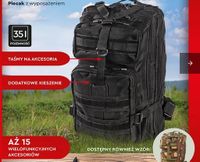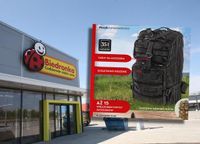In a move that seems to align with growing public concerns about safety and preparedness, Polish supermarket chain Biedronka has reintroduced their 'war backpacks'—a product that seems tailored for emergencies. These backpacks, which were previously available in mid-2024, are marketed as a baseline survival kit for potential evacuation situations amid ongoing geopolitical tensions. Amid the backdrop of rising threats from Russia in the context of the Ukraine conflict, many Poles are now turning towards items designed for possible emergency scenarios.
The contents of these backpacks might be surprising to some, featuring items such as a flashlight with SOS mode, a fire starter, and a thermal sleeping bag complete with a whistle and carabiner. Biedronka's decision to market such a product comes as various branches of the Polish government, including the Ministry of National Defense and the Government Centre for Security (RCB), are preparing their own crisis guideline materials to be distributed throughout the country.
In fact, similar 'evacuation backpacks' were part of the store's offerings last year, which included various survival tools and accessories designed for both emergency and conventional uses. The current iteration of the backpack can be purchased for 129 zł, significantly cheaper than the high-end alternatives that can range up to 3,000 zł, making it an accessible option for a broader audience.
These backpacks come in two color options and boast essential survival gear, including a tactical knife, a crowbar, a notebook with a pencil, rain gear, pliers, a three-in-one USB cable, a universal bag, a steel mug, and a five-in-one tool, along with an elastic cord with hooks. It must be noted that while the contents somewhat fulfill the basics outlined by RCB for evacuation preparation, the items listed in the 'war backpack' are not exhaustive. RCB suggests including additional necessities such as battery-powered radios, masks, ropes, two days' worth of meals, a first aid kit, and more, emphasizing that individuals need to be equipped to survive without state assistance for at least three days.
Wiesław Leśniakiewicz, Deputy Head of the Ministry of Interior and Administration (MSWiA), stated, "In a crisis situation, the state does not replace the actions of the citizen. We must be prepared for at least three days of survival without state assistance, including supplies of water, necessary medicines, food, and a transistor radio, which may serve as the only source of communication during such times." These recommendations are part of a broader initiative to educate citizens about being self-reliant during emergencies.
Earlier instructions by RCB emphasized readiness for sudden evacuations, which led to an increase in online listings for ready-made escape backpacks. This heightened awareness of preparedness is in response to Poland's evolving security landscape, propelled by the ongoing conflict in Ukraine. Thus, it is no surprise that retailers like Biedronka are capitalizing on this need with products that serve to equip everyday citizens for emergency scenarios.
As the crisis guides develop and are scheduled for release by the end of April online, with physical distribution expected to reach all households by the end of 2025, the public's appetite for emergency preparedness is sure to remain prominent. It is also anticipated that as the situation evolves, more individuals will look for budget-friendly yet practical survival solutions, further pushing supermarkets and retailers to adapt to this urgent demand.
The recent surge in supply reflects not just a consumer trend but also a significant shift in public consciousness regarding crisis readiness. With Biedronka at the forefront of this trend through its economical offerings, individuals increasingly find themselves compelled to consider their preparedness levels as geopolitical uncertainties continue to linger. As such scenarios potentially escalate, having even a basic survival backpack may just become an essential part of many households across Poland.



